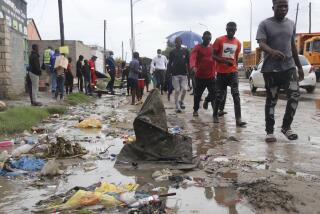U.S. doctors prepare isolation ward for Ebola patient
Medical personnel are preparing for a deadly strain of the Ebola virus to touch down on U.S. soil for the first time Saturday as Americans fret about their safety and international health officials warn that the deadly outbreak is spreading out of control in Africa.
Two stricken American citizens who have been volunteering with Christian aid organizations in Liberia are being evacuated from the West African nation and will be treated at Emory University Hospital in a specially outfitted containment unit that was built with the help of the Centers for Disease Control and Prevention. The first patient is expected to arrive on Saturday, with the second to follow shortly after.
The isolation ward is virtually airtight and designed to handle patients with highly infectious and dangerous diseases, said Dr. Bruce Ribner, who oversees the ward.
Planning for the arrival of the U.S. patients continued as the United Nations’ top health official pledged Friday to release $100 million in funding to deploy hundreds of medical staffers to fight the virus, which has sickened more than 1,300 people and killed at least 729 in Africa.
“This outbreak is moving faster than our efforts to control it,” Dr. Margaret Chan, director-general of the World Health Organization, told leaders of four West African countries gathered in Conakry, the capital of Guinea, just north of Liberia. “If the situation continues to deteriorate, the consequences can be catastrophic in terms of lost lives but also severe socioeconomic disruption and a high risk of spread to other countries.”
In general, between 45% and 90% of those sickened by Ebola die as a result, and many Americans are anxious that the virus is being knowingly imported into the country. But Ribner said there was no question that bringing the critically ill patients here was the right thing to do.
“They have gone over on a humanitarian mission [and] they have become infected giving medical care,” said Ribner, a professor in the infectious disease division at Emory who will help take care of the two patients. “We owe them the right to receive the best medical care that is available.”
Despite such reassurances, some Atlantans said they were uncomfortable with the idea of Ebola patients being treated in their hometown.
“That worries me,” said Lisa Jackson as she waited for a bus near the hospital. “They shouldn’t even let them across the border.”
Even those who were more willing to welcome the ailing aid workers expressed some trepidation.
“If this is the only place they can get help, then sure, they should bring them here,” said Greg Hammock. But, he added, “Emory better be on top of their game.”
Hospital officials said that they are. A core team trained to treat patients with highly infectious diseases has been conducting regular drills for 12 years, said Alexander Isakov, executive director of Emory’s office of critical event preparedness and response.
Neither Isakov nor Ribner identified the patients by name, but they are believed to be Dr. Kent Brantly and missionary Nancy Writebol. Samaritan’s Purse, the aid group that employs Brantly, sent an air ambulance to Liberia to fly them home. (Writebol was serving alongside Brantly under the auspices of another group called SIM.)
Both patients have been deemed fit to travel by medical staff who have examined them, Ribner said. The air ambulance will make two trips, delivering the patients separately.
Isakov said he would be alerted when the plane is about two or three hours from Atlanta. He will meet the aircraft in a specially outfitted ambulance staffed by two paramedics and a supervisor. The vehicle looks like a regular ambulance on the outside, but inside it has a tent-like enclosure that ensures the medical staff will be protected from the virus.
Once the patients are set up in the hospital’s isolation ward, they will be able to see visitors only through a plate-glass window and to speak to them via an intercom system. The hospital room has a telephone as well.
Each patient will be cared for by two nurses as well as infectious disease doctors and other specialists. All medical staffers who treat them will don masks, hoods, gloves and an outer shell over their clothing to protect them from vomit, saliva, mucus and other bodily fluids that can spread the virus.
Patients infected with Ebola experience sudden fever, intense weakness, muscle pain, headaches, vomiting and diarrhea. As the disease progresses, it can cause kidney and liver failure as well as massive internal bleeding.
There is no vaccine or specific treatment for the infection, but Ribner said he was “cautiously optimistic” that the Americans could be treated successfully. Patients need “supportive care,” which can include intravenous fluids, blood products and being put on a respirator and a dialysis machine depending on the extent of the illness. Such treatments are readily available here, but not necessarily in Liberia or much of West Africa.
“We just have to keep the body alive long enough for the body to survive this infection,” Ribner said. “If they can arrive in a reasonably good state, we have a reasonable chance of restoring them” to good health, he said.
The two aid workers have reportedly received some unconventional treatments in Liberia. Writebol was given an unidentified “experimental serum,” while Brantly got a blood transfusion from a 14-year-old boy who survived the disease after Brantly cared for him.
Dr. Tom Frieden, director of the CDC, said he didn’t know any details about these medical interventions but that no treatments currently available had been proven to help.
“We do not have effective treatment or vaccine for Ebola,” he said. “There is not likely to be one for at least a year, even in the best-case scenario. We are not going to treat or vaccinate our way out of these outbreaks.”
Doctors Without Borders offered a grim assessment, saying that the virus was raging “out of control” in Liberia and Sierra Leone and was on the rise again in Guinea.
“There has been a significant surge in the epidemic,” spokeswoman Sandra Murillo said in a statement. Although there are “critical gaps” in care, the group does not have the resources to augment its force of 550 health workers already deployed to the region, she said.
The terror in West Africa has hampered efforts to control it. The widespread view that Ebola is uniformly fatal has kept people away from hospitals and other treatment facilities, which are associated with death.
Instead of entering isolation wards, sick people have been hiding out at home and turning to traditional healers, causing the virus to spread.
It’s important for health officials to try to change people’s minds about the virus, the WHO’s Chan said: “Public attitudes can create a security threat to response teams when fear and misunderstanding turn to anger, hostility or violence.”
Previous outbreaks had occurred in remote areas of Africa, where the population wasn’t mobile, making it easier to contain. But this outbreak occurred in a more densely populated region with a highly mobile population, accounting for the rapid spread of the disease and difficulties containing it.
“It’s particularly dangerous when it gets into areas that are densely populated and have weak health infrastructure,” said Ebola expert G. Richard Olds, dean of the School of Medicine at UC Riverside.
The deteriorating situation has prompted Samaritan’s Purse and SIM to begin evacuating 60 nonessential staff personnel and dependents from Liberia, the aid organizations said.
“They are all healthy, and we expect them to return to the United States by the end of the weekend,” according to a statement from Samaritan’s Purse.
As bleak as things seem, Frieden expressed confidence that tried-and-true public health measures would overpower the virus.
“We are going to use the traditional means that work of case identification, isolation, contact tracing, health communication, good meticulous management,” he said. “That’s what has stopped every Ebola outbreak that’s ever happened before. That’s what will stop this Ebola outbreak.”
Susman reported from Atlanta, Morin and Mai-Duc from Los Angeles. Times staff writer Robyn Dixon in Johannesburg, South Africa, contributed to this report.









